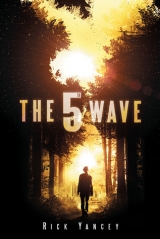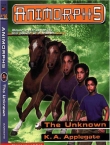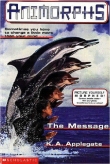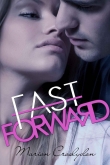
Текст книги "The 5th Wave"
Автор книги: Rick Yancey
Жанры:
Подростковая литература
,сообщить о нарушении
Текущая страница: 9 (всего у книги 27 страниц)


I’VE FALLEN SO DEEP, nothing can reach me. For the first time in weeks, I feel numb. I don’t even feel like me. There’s no place where I end and the nothingness begins.
Her voice comes into the darkness, and I grab on to it, a lifeline to pull me out of the bottomless well.
“It’s over. It’s all right. It’s over…”
I break the surface into the real world, gasping for air, crying uncontrollably like a complete pansy, and I’m thinking, You’re wrong, Doc. It’s never over. It just goes on and on and on. Her face swims into view, and my arm jerks against the restraint as I try to grab her. She needs to make this stop.
“What the hell was that?” I ask in a croaky whisper. My throat is burning, my mouth dry. I feel like I weigh about five pounds, like all the flesh has been torn from my bones. And I thought the plague was bad!
“It’s a way for us to see inside you, to look at what’s really going on,” she says gently. She runs her hand over my forehead. The gesture reminds me of my mother, which reminds me of losing my mother in the dark, of running from her in the night, which reminds me I shouldn’t be strapped down in this white chair. I should be with them. I should have stayed and faced what they faced. Take care of your little sister.
“That’s my next question,” I say, fighting to stay focused. “What’s going on?”
“They’re inside us,” she answers. “We were attacked from the inside, by infected personnel who’d been embedded in the military.”
She gives me a few minutes to process this while she wipes the tears from my face with a cool, moist cloth. It’s maddening, how motherly she is, and the soothing coolness of the cloth, a pleasant torture.
She sets aside the cloth and looks deeply into my eyes. “Using the ratio of infected to clean here at the base, we estimate that one out of every three surviving human beings on Earth is one of them.”
She loosens the straps. I’m insubstantial as a cloud, light as a balloon. When the final strap comes free, I expect to fly out of the chair and smack the ceiling.
“Would you like to see one?” she asks.
Holding out her hand.


SHE WHEELS ME down a hallway to an elevator. It’s a one-way express that carries us several hundred feet below the surface. The doors open into a long corridor with white cinder-block walls. Dr. Pam tells me we’re in the bomb shelter complex that’s nearly as large as the base above us, built to withstand a fifty-megaton nuclear blast. I tell her I’m feeling safer already. She laughs like she thinks that’s very funny. I’m rolling past side tunnels and unmarked doors and, though the floor is level, I feel as if I’m being taken to the very bottom of the world, to the hole where the devil sits. There are soldiers hurrying up and down the corridor; they avert their eyes and stop talking as I’m wheeled past them.
Would you like to see one?
Yes. Hell no.
She stops at one of the unmarked doors and swipes a key card through the locking mechanism. The red light turns green. She rolls me into the room, stopping the chair in front of a long mirror, and my mouth falls open and I drop my chin and close my eyes, because whatever is sitting in that wheelchair isn’t me, it can’t be me.
When the mothership first appeared, I was one hundred and ninety pounds, most of it muscle. Forty pounds of that muscle is gone. The stranger in that mirror looked back at me with the eyes of the starving: huge, sunken, ringed in puffy, black bags. The virus has taken a knife to my face, carving away my cheeks, sharpening my chin, thinning my nose. My hair is stringy, dry, falling out in places.
He’s gone zombie.
Dr. Pam nods at the mirror. “Don’t worry. He won’t be able to see us.”
He? Who’s she talking about?
She hits a button, and the lights in the room on the other side of the mirror flood on. My image turns ghostlike. I can see through myself to the person on the other side.
It’s Chris.
He’s strapped to a chair identical to the one in the Wonderland room. Wires run from his head to a large console with blinking red lights behind him. He’s having trouble keeping his head up, like a kid nodding off in class.
She notices my stiffening at the sight of him and asks, “What? Do you know him?”
“His name is Chris. He’s my…I met him in the refugee camp. He offered to share his tent and he helped me when I got sick.”
“He’s your friend?” She seems surprised.
“Yes. No. Yes, he’s my friend.”
“He’s not what you think he is.”
She touches a button, and the monitor pops to life. I tear my eyes away from Chris, from the outside of him to the inside, from apparent to hidden, because on the screen I can see his brain encased in translucent bone, glowing a sickly yellowish green.
“What is that?” I whisper.
“The infestation,” Dr. Pam says. She presses a button and zooms in on the front part of Chris’s brain. The pukish color intensifies, glowing neon bright. “This is the prefrontal cortex, the thinking part of the brain—the part that makes us human.”
She zooms in tight on an area no larger than the head of a pin, and then I see it. My stomach does a slow roll. Embedded in the soft tissue is a pulsing egg-shaped growth, anchored by thousands of rootlike tendrils fanning out in all directions, digging into every crease and crevice of his brain.
“We don’t know how they did it,” Dr. Pam says. “We don’t even know if the infected are aware of their presence, or if they’ve been puppets their entire lives.”
The thing entangling itself in Chris’s brain, pulsing.
“Take it out of him.” I can barely form words.
“We’ve tried,” Dr. Pam says. “Drugs, radiation, electroshock, surgery. Nothing works. The only way to kill them is to kill the host.”
She slides the keyboard in front of me. “He won’t feel anything.”
Confused, I shake my head. I don’t get it.
“It lasts less than a second,” Dr. Pam assures me. “And it’s completely painless. This button right here.”
I look down at the button. It has a label: EXECUTE.
“You’re not killing Chris. You’re destroying the thing inside him that would kill you.”
“He had his chance to kill me,” I argue. Shaking my head. It’s too much. I can’t deal. “And he didn’t. He kept me alive.”
“Because it wasn’t time yet. He left you before the attack, didn’t he?”
I nod. I’m looking at him again through the two-way mirror, through the indistinct frame of my see-through self.
“You’re killing the things that are responsible for this.” She presses something into my hand.
Sissy’s locket.
Her locket, the button, and Chris. And the thing inside Chris.
And me. Or what’s left of me. What’s left of me? What do I have left? The metal links of Sissy’s necklace cut into my palm.
“It’s how we stop them,” Dr. Pam urges me. “Before there’s no one left to stop them.”
Chris in the chair. The locket in my hand. How long have I been running? Running, running, running. Christ, I’m sick of running. I should have stayed. I should have faced it. If I had faced it then, I wouldn’t be facing it now, but sooner or later you have to choose between running and facing the thing you thought you could not face.
I bring my finger down as hard as I can.


I LIKE THE CONVALESCENT WING a lot more than the Zombie Ward. It smells better, for one thing, and you get your own room. You’re not stuck out on the floor with a hundred other people. The room is quiet and private, and it’s easy to pretend the world is what it was before the attacks. For the first time in weeks, I’m able to eat solid food and make it to the bathroom by myself—though I avoid looking in the mirror. The days seem brighter, but the nights are bad: Every time I close my eyes, I see my skeletal self in the execution room, Chris strapped down in the room on the other side, and my bony finger coming down.
Chris is gone. Well, according to Dr. Pam, Chris never was. There was the thing inside Chris controlling him that had embedded itself into his brain (they don’t know how) sometime in the past (they don’t know when). No aliens descended from the mothership to attack Wright-Patterson. The attack came from within, with infested soldiers turning their guns on their comrades. Which meant they had been hiding inside us for a long time, waiting for the first three waves to whittle our population down to a manageable number before revealing themselves.
What did Chris say? They know how we think.
They knew we’d seek safety in numbers. Knew we’d take shelter with the guys who had guns. So, Mr. Alien, how do you overcome that? It’s simple, because you know how we think, don’t you? You embed sleeper units where the guns are. Even if your troops fail in the initial assault, like they did at Wright-Patterson, you succeed in your ultimate goal of blowing society apart. If the enemy looks just like you, how do you fight him?
At that point, it’s game over. Starvation, disease, wild animals: It’s only a matter of time before the last, isolated survivors are dead.
From my window six stories up I can see the front gates. Around dusk, a convoy of old yellow school buses rolls out, escorted by Humvees. The buses return several hours later loaded down with people, mostly kids—though it’s hard to tell in the dark—who are taken into the hangar to be tagged and bagged, the “infested” winnowed out and destroyed. That’s what my nurses tell me, anyway. To me, the whole thing seems crazy, given what we know about the attacks. How did they kill so many of us so quickly? Oh yeah, because humans herd like sheep! And now here we are, clustering again. Right in plain sight. We might as well paint a big red bull’s-eye on the base. Here we are! Fire when ready!
And I can’t take it anymore.
Even as my body grows stronger, my spirit begins to crumple.
I really don’t get it. What’s the point? Not their point; that’s been pretty damn clear from the beginning.
I mean what’s the point of us anymore? I’m sure if we didn’t cluster again, they’d have another plan, even if that plan were using infested assassins to take us out one stupid, isolated human at a time.
There’s no winning. If I had somehow saved my sister, it wouldn’t have mattered. I would have bought her another month or two tops.
We’re the dead. There’s no one else now. There’s the past-dead and the future-dead. Corpses and corpses-to-be.
Somewhere between the basement room and this room, I lost Sissy’s locket. I wake up in the middle of the night, my hand clutching empty air, and I hear her screaming my name like she’s standing two feet away, and I’m furious, I’m pissed as hell, and I tell her to shut up, I lost it, it’s gone. I’m dead like her, doesn’t she get it? A zombie, that’s me.
I stop eating. I refuse my meds. I lie in bed for hours, staring at the ceiling, waiting for it to be over, waiting to join my sister and the seven billion other lucky ones. The virus that was eating me has been replaced by a different disease that’s even more hungry. A disease with a kill rate of 100 percent. And I tell myself, Don’t let them do it, man! This is part of their plan, too, but it doesn’t do any good. I can give myself pep talks all day long; it doesn’t change the fact that the moment the mothership appeared in the sky, it was game over. Not a matter of if, but when.
And right when I reach the point of no return, when the last part of me able to fight is about to die, as if he’s been waiting all this time for me to reach that point, my savior appears.
The door opens and his shadow fills the space—tall, lean, hard-edged, as if his shadow were cut from a slab of black marble. That shadow falls over me as he walks toward the bed. I want to look away, but I can’t. His eyes—cold and blue as a mountain lake—pin me down. He comes into the light, and I can see his short-cropped sandy hair and his sharp nose and his thin lips drawn tight in a humorless smile. Crisp uniform. Shiny black boots. The officer insignia on his collar.
He looks down at me in silence for a long, uncomfortable moment. Why can’t I look away from those ice-blue eyes? His face is so chiseled it looks unreal, like a wood carving of a human face.
“Do you know who I am?” he asks. His voice is deep, very deep, a voice-over-on-a-movie-preview deep. I shake my head. How the hell could I know that? I’d never seen him before in my life.
“I’m Lieutenant Colonel Alexander Vosch, the commander of this base.”
He doesn’t offer me his hand. He just stares at me. Steps around to the end of the bed, looks at my chart. My heart is pounding hard. It feels like I’ve been called to the principal’s office.
“Lungs good. Heart rate, blood pressure. Everything’s good.” He hangs the chart back on the hook. “Only everything isn’t good, is it? In fact, everything is pretty damn bad.”
He pulls a chair close to the bed and sits down. The motion is seamless, smooth, uncomplicated, like he’s practiced it for hours and gotten sitting down to an exact science. He adjusts the crease in his pants into a perfectly straight line before he goes on.
“I’ve seen your Wonderland profile. Very interesting. And very instructive.”
He reaches into his pocket, again with so much grace that it’s more like a dance move than a gesture, and pulls out Sissy’s silver locket.
“I believe this is yours.”
He drops it on the bed next to my hand. Waits for me to grab it. I force myself to lie still, I’m not sure why.
His hand returns to his breast pocket. He tosses a wallet-size photo into my lap. I pick it up. There’s a little blond kid around six, maybe seven. With Vosch’s eyes. Being held in the arms of a pretty lady around Vosch’s age.
“You know who they are?”
Not a hard question. I nod. For some reason, the picture bothers me. I hold it out for him to take back. He doesn’t.
“They’re my silver chain,” he says.
“I’m sorry,” I say, because I don’t know what else to say.
“They didn’t have to do it this way, you know. Have you thought about that? They could have taken their own sweet time killing us—so why did they decide to kill us so quickly? Why send down a plague that kills nine out of every ten people? Why not seven out of ten? Why not five? In other words, what’s their damn hurry? I have a theory about that. Would you like to hear it?”
No, I think. I wouldn’t. Who is this guy, and why is he here talking to me?
“There’s a quote from Stalin,” he says. “‘A single death is a tragedy; a million is a statistic.’ Can you imagine seven billion of anything? I have trouble doing it. It pushes the limits of our ability to comprehend. And that’s exactly why they did it. Like running up the score in football. You played football, right? It isn’t about destroying our capability to fight so much as crushing our will to fight.”
He takes the photograph and slips it back into his pocket. “So I don’t think about the 6.98 billion people. I think about just two.”
He nods toward Sissy’s locket. “You left her. When she needed you, you ran. And you’re still running. Don’t you think it’s time you stop running and fight for her?”
I open my mouth, and whatever I meant to say comes out as, “She’s dead.”
He waves his hand in the air. I’m being stupid. “We’re all dead, son. Some of us are just a little further along than others. You’re wondering who the hell I am and why I’m here. Well, I told you who I am, and now I’m going to tell you why I’m here.”
“Good,” I whisper. Maybe after he tells me, he’ll leave me alone. He’s weirding me out. Something about the way he looks at me with that icy stare, the—there’s no other word for it—hardness of him, like he’s a statue come to life.
“I’m here because they’ve killed almost all of us, but not all of us. And that’s their mistake, son. That’s the flaw in their plan. Because if you don’t kill all of us all at once, whoever’s left are not going to be the weak ones. The strong ones—and only the strong ones—will survive. The bent but unbroken, if you know what I mean. People like me. And people like you.”
I’m shaking my head. “I’m not strong.”
“Well, that’s where you and I will have to disagree. You see, Wonderland doesn’t just map out your experiences; it maps out you. It tells us not just who you are, but what you are. Your past and your potential. And your potential, I kid you not, is off the charts. You are exactly what we need at exactly the time we need it.”
He stands up. Towering over me. “Get up.”
Not a request. His voice is as rock hard as his features. I heave myself onto the floor. He brings his face close to mine and says in a low, dangerous voice, “What do you want? Be honest.”
“I want you to leave.”
“No.” Shaking his head sharply. “What do you want?”
I feel my lower lip poking out, like a tiny kid about to collapse completely. My eyes are burning. I bite down hard on the edges of my tongue and force myself not to look away from the cold fire in his eyes.
“Do you want to die?”
Do I nod? I can’t remember. Maybe I did, because he says, “I’m not going to let you. So now what?”
“So I guess I’m going to live.”
“No, you’re not. You’re going to die. You’re going to die, and there’s nothing you or I or anyone else can do to stop it. You, me, everyone left on this big, beautiful blue planet is going to die and make way for them.”
He’s cut right to the heart of it. It’s the perfect thing to say at the perfect moment, and what he’s been trying to get out of me suddenly explodes.
“Then what’s the point, huh?” I shout into his face. “What’s the fucking point? You have all the answers, so you tell me, because I have no idea anymore why I should give a damn!”
He grabs me by the arm and slings me toward the window. He’s beside me in two seconds and flings open the curtain. I see the school buses idling beside the hangar and a line of children waiting to go inside.
“You’re asking the wrong person,” he snarls. “Ask them why you should give a damn. Tell them there’s no point. Tell them you want to die.”
He grabs my shoulders and whirls me around to face him. Slaps me hard in the chest.
“They’ve flipped the natural order on us, boy. Better to die than live. Better to give up than fight. Better to hide than face. They know the way to break us is to kill us first here.” Slapping my chest again. “The final battle for this planet will not be fought over any plain or mountain or jungle or desert or ocean. It will happen here.” Popping me again. Hard. Pop, pop, pop.
And I’m totally gone by this point, giving in to everything I’ve bottled up inside since the night my sister died, sobbing like I’ve never cried before, like crying is something new to me and I like the way it feels.
“You are the human clay,” Vosch whispers fiercely in my ear. “And I am Michelangelo. I am the master builder, and you will be my masterpiece.” Pale blue fire in his eyes, burning to the bottom of my soul. “God doesn’t call the equipped, son. God equips the called. And you have been called.”
He leaves me with a promise. The words burn so hot in my mind, the promise follows me into the deepest hours of the night and into the days that follow.
I will teach you to love death. I will empty you of grief and guilt and self-pity and fill you up with hate and cunning and the spirit of vengeance. I will make my final stand here, Benjamin Thomas Parish.
Slapping my chest over and over until my skin burns, my heart on fire. And you will be my battlefield.



IT SHOULD have been easy. All he had to do was wait.
He was very good at waiting. He could crouch for hours, motionless, silent, he and his rifle one body, one mind, the line fuzzy between where he ended and the weapon began. Even the fired bullet seemed connected to him, bound by an invisible cord to his heart, until the bullet wedded bone.
The first shot dropped her, and he quickly fired again, missing entirely. A third shot as she dived to the ground beside the car, and the back window of the Buick exploded in a cloud of pulverized shatterproof glass.
She’d gone under the car. Her only option, really, which left him two: wait for her to come out or leave his position in the woods bordering the highway and end it. The option with the least risk was staying put. If she crawled out, he would kill her. If she didn’t, time would.
He reloaded slowly, with the deliberateness of someone who knows he has all the time in the world. After days of stalking her, he guessed she wasn’t going anywhere. She was too smart for that. Three shots had failed to take her down, but she understood the odds of a fourth missing. What had she written in her diary?
In the end it wouldn’t be the lucky ones left standing.
She would play the odds. Crawling out had zero chance of success. She couldn’t run, and even if she could, she didn’t know in which direction safety lay. Her only hope was for him to abandon his hiding place and force the issue. Then anything was possible. She might even get lucky and shoot him first.
If there was a confrontation, he didn’t doubt she would refuse to go down quietly. He had seen what she did to the soldier in the convenience store. She may have been terrified at the time, and killing him may have bothered her afterward, but her fear and guilt didn’t stop her from filling his body with lead. Fear didn’t paralyze Cassie Sullivan, like it did some humans. Fear crystallized her reason, hardened her will, clarified her options. Fear would keep her under the car, not because she was afraid of coming out, but because staying there was her only hope of staying alive.
So he would wait. He had hours before nightfall. By then, she would have either bled to death or be so weak from blood loss and dehydration that finishing her would be easy.
Finishing her. Finishing Cassie. Not Cassie for Cassandra. Or Cassie for Cassidy. Cassie for Cassiopeia, the girl in the woods who slept with a teddy bear in one hand and a rifle in the other. The girl with the strawberry blond curls who stood a little over five feet four in her bare feet, so young-looking he was surprised to learn she was sixteen. The girl who sobbed in the pitch black of the deep woods, terrified one moment, defiant the next, wondering if she was the last person on Earth, while he, the hunter, hunkered a dozen feet away, listening to her cry until exhaustion carried her down into a restless sleep. The perfect time to slip silently into her camp, put the gun to her head, and finish her. Because that’s what he did. That’s what he was: a finisher.
He had been finishing humans since the advent of the plague. For four years now, since he was fourteen, when he awakened inside the human body chosen for him, he had known what he was. Finisher. Hunter. Assassin. The name didn’t matter. Cassie’s name for him, Silencer, was as good as any. It described his purpose: to snuff out the human noise.
But he didn’t that night. Or the nights that followed. And each night, creeping a little closer to the tent, inching his way over the woodland blanket of decaying leaves and moist loamy soil until his shadow rose in the narrow opening of the tent and fell over her, and the tent was filled with her smell, and there would be the sleeping girl clutching the teddy bear and the hunter holding his gun, one dreaming of the life that was taken from her, the other thinking of the life he’d take. The girl sleeping and the finisher, willing himself to finish her.
Why didn’t he finish her?
Why couldn’t he finish her?
He told himself it was unwise. She couldn’t stay in these woods indefinitely. He could use her to lead him to others of her kind. Humans are social animals. They cluster like bees. The attacks relied on this critical adaptation. The evolutionary imperative that drove them to live in groups was the opportunity to kill them by the billions. What was the saying? Strength in numbers.
And then he found the notebooks and discovered there was no plan, no real goal except to survive to the next day. She had nowhere to go and no one left to go to. She was alone. Or thought she was.
He didn’t return to her camp that night. He waited until the afternoon of the following day, not telling himself he was giving her time to pack up and leave. Not letting himself think about her silent, desperate cry: Sometimes I think I might be the last human on Earth.
Now, as the last human’s last minutes spun out beneath the car on the highway, the tension in his shoulders began to fade. She wasn’t going anywhere. He lowered the rifle and squatted at the base of the tree, rolling his head from side to side to ease the stiffness in his neck. He was tired. Hadn’t been sleeping well lately. Or eating. He’d dropped some pounds since the 4th Wave rolled out. He wasn’t too concerned. They’d anticipated some psychological and physical blowback at the beginning of the 4th Wave. The first kill would be the hardest, but the next would be easier, and the one after that easier still, because it’s true: Even the most sensitive person can get used to even the most insensitive thing.
Cruelty isn’t a personality trait. Cruelty is a habit.
He pushed that thought away. To call what he was doing cruel implied he had a choice. Choosing between your kind and another species wasn’t cruel. It was necessary. Not easy, especially when you’ve lived the last four years of your life pretending to be no different from them, but necessary.
Which raised the troubling question: Why didn’t he finish her that first day? When he heard the shots inside the convenience store and followed her back to the campsite, why didn’t he finish her then, while she lay crying in the dark?
He could explain away the three missed shots on the highway. Fatigue, lack of sleep, the shock of seeing her again. He had assumed she would head north, if she ever left her camp at all, not head back south. He had felt a sudden rush of adrenaline, as if he’d turned a street corner and run into a long-lost friend. That must have been what threw off that first shot. The second and third he could chalk up to luck—her luck, not his.
But what about all those days that he followed her, sneaking into her camp while she was away foraging, doing a bit of foraging himself through her belongings, including the diary in which she had written, Sometimes in my tent, late at night, I think I can hear the stars scraping against the sky? What about those predawn mornings when he slid silently through the woods to where she slept, determined to finish it this time, to do what he had prepared all his life to do? She wasn’t his first kill. She wouldn’t be his last.
It should have been easy.
He rubbed his slick palms against his thighs. It was cool in the trees, but he was dripping with sweat. He scrubbed his sleeve across his eyes. The wind on the highway: a lonely sound. A squirrel scampered down the tree next to him, unconcerned by his presence. Below him, the highway disappeared over the horizon in both directions, and nothing moved except the trash and the grass bowing in the lonely wind. The buzzards had found the three bodies lying in the median; three fat birds waddled in for a closer look while the rest of the flock circled in the updrafts high overhead. The buzzards and other scavengers were enjoying a population explosion. Buzzards, crows, feral cats, packs of hungry dogs. He’d stumbled upon more than one desiccated corpse that had clearly been someone’s dinner.
Buzzards. Crows. Aunt Millie’s tabby. Uncle Herman’s Chihuahua. Blowflies and other insects. Worms. Time and the elements clean up the rest. If she didn’t come out, Cassie would die beneath the car. Within minutes of her last breath, the first fly would arrive to lay eggs in her.
He pushed the distasteful image away. It was a human thought. It had been only four years since his Awakening, and he still fought against seeing the world through human eyes. On the day of his Awakening, when he saw the face of his human mother for the first time, he burst into tears: He had never seen anything so beautiful—or so ugly.
It had been a painful integration for him. Not seamless or quick, like some Awakenings he’d heard of. He supposed his had been more difficult than others because the childhood of his host body had been a happy one. A well-adjusted, healthy human psyche was the hardest to absorb. It had been—still was—a daily struggle. His host body wasn’t something apart from him that he manipulated like a puppet on a string. It was him. The eyes he used to see the world, they were his eyes. This brain he used to interpret, analyze, sense, and remember the world, it was his brain, wired by thousands of years of evolution. Human evolution. He wasn’t trapped inside it and didn’t ride about in it, guiding it like a jockey on a horse. He was this human body, and it was him. And if something should happen to it—if, for example, it died—he would perish with it.
It was the price of survival. The cost of his people’s last, desperate gamble:
To rid his new home of humanity, he had to become human.
And being human, he had to overcome his humanity.
He stood up. He didn’t know what he was waiting for. Cassie for Cassiopeia was doomed, a breathing corpse. She was badly injured. Run or stay, there was no hope. She had no way to treat her wound and no one for miles who could help her. She had a small tube of antibiotic cream in her backpack, but no suture kit and no bandages. In a few days, the wound would become infected, gangrene would set in, and she would die, assuming another finisher didn’t come along in the interim.
He was wasting time.
So the hunter in the woods stood up, startling the squirrel. It rocketed up the tree with an angry hiss. He swung his rifle to his shoulder and brought the Buick into the sight, swinging the red crosshairs back and forth and up and down its body. What if he blew out the tires? The car would collapse onto its rims, perhaps pinning her beneath its two-thousand-pound frame. There’d be no running then.
The Silencer lowered his rifle and turned his back on the highway.
The buzzards feeding in the median heaved their cumbersome bodies into the air.
The lonely wind died.
And then his hunter’s instinct whispered, Turn around.
A bloody hand emerged from the undercarriage. An arm followed. Then a leg.
He swung his rifle into position. Sighted her in the crosshairs. Holding his breath, sweat coursing down his face, stinging his eyes. She was going to do it. She was going to run. He was relieved and anxious at the same time.








